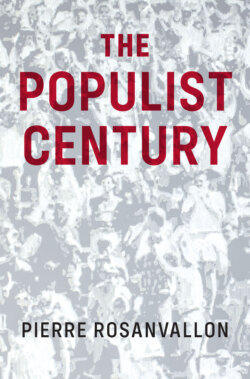Читать книгу The Populist Century - Pierre Rosanvallon - Страница 7
The anatomy of populism
ОглавлениеThis part is built around a presentation of the five elements that make up populist political culture: a conception of “the people,” a theory of democracy, a mode of representation, a politics and a philosophy of economics, and a regime of passions and emotions. The conception of the people, based on the distinction between “them” and “us,” is the element that has been most often analyzed. I shall enrich the usual description, however, first by shoring it up with an analysis of the tension between the people as a civic body and the people as a social body, and second by showing how the term “people” has acquired a renewed capacity to shape the social world in an age of individualism based on singularities. The populist theory of democracy is based, for its part, on three elements: a preference for direct democracy (illustrated by the glorification of the referendum process); a polarized and hyper-electoralist vision of the sovereignty of the people that rejects intermediary bodies and aims to domesticate non-elective institutions (such as constitutional courts and independent authorities); and an understanding of the general will as capable of expressing itself spontaneously. The populist conception of representation is in turn linked with the foregrounding of the figure of a “leader standing for the people,” an individual who manifests a perceptible quality of embodiment, as a remedy for the existing state of unsatisfactory representation. National protectionism is another constitutive element of the populist ideology, moreover, provided that it is understood as not limited to economic policy. National protectionism is in fact more deeply inscribed in a sovereignist vision of reconstructing the political will and ensuring the security of a population. The economic sphere is thus in this respect eminently political. Finally, the political culture of populism is explicitly attached to the mobilization of a set of emotions and passions whose importance is recognized and theorized here. I shall distinguish among emotions related to intellection (destined to make the world more readable through recourse to what are essentially conspiracy narratives), emotions related to action (rejectionism), and emotions related to status (the feeling of being abandoned, of being invisible). Populism has recognized the role of affects in politics and used them in pioneering ways, going well beyond the traditional recipes for seduction. Once the ideal type of populism has been fleshed out on the basis of these five elements, we shall examine the diversity of populisms, taking particular care to analyze the distinction between populisms on the left and those on the right.
